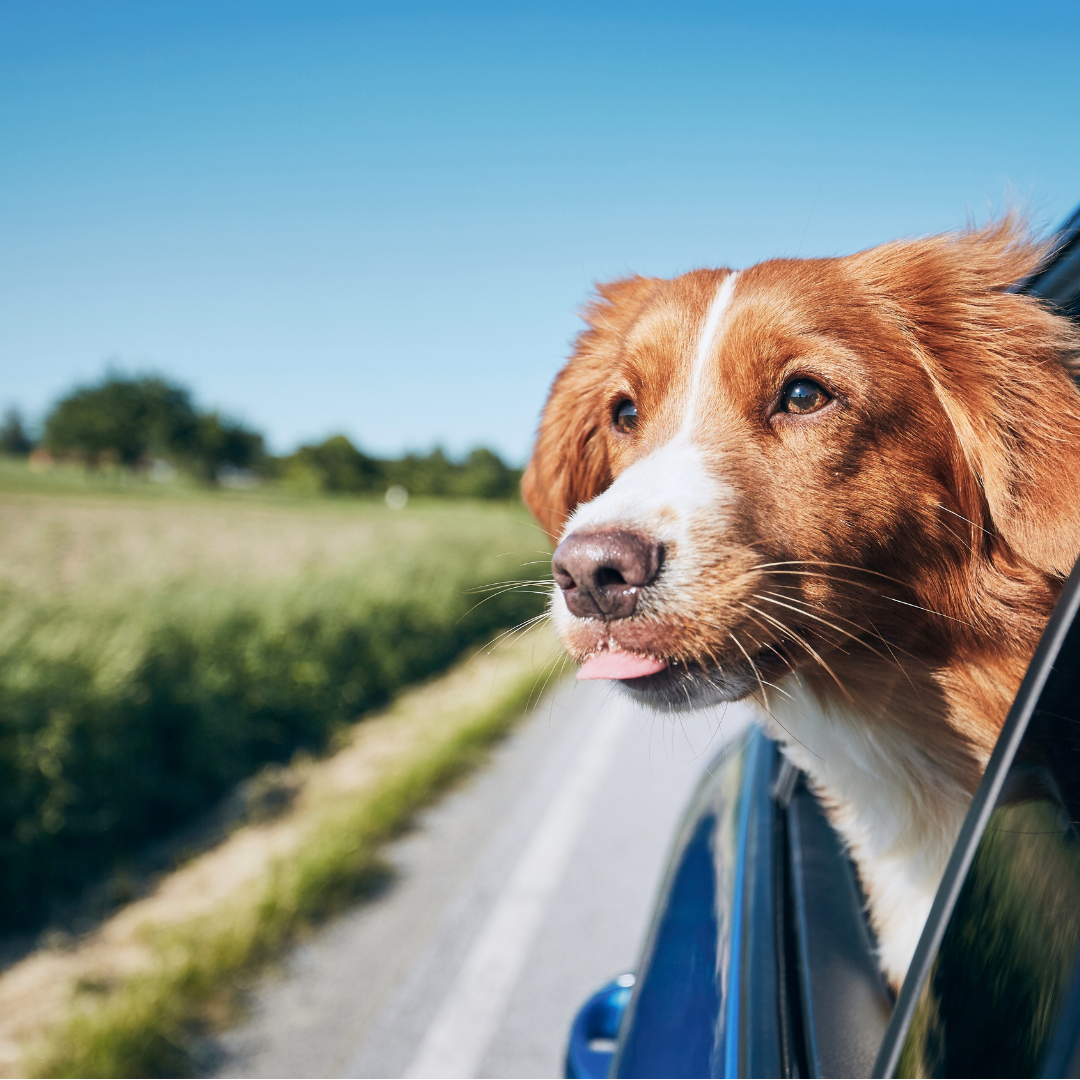By Jen Flatt Osborn
It’s that time again. Time to get away with your family and enjoy the fruits of your labor. If you wish you had a pet travel checklist to prepare everyone for the trip, we have the perfect one for you.
Whether you’re going to see your college roomie or to the annual family reunion, your pet needs to be safe and sound as you travel. We here at SAHPS want you and your pet to have the perfect getaway so here are the most important things you need to make sure that happens.
Pet Travel Checklist
The Basics
-
Food – Don’t rely on buying food when you get there. If there are extenuating circumstances like inclement weather or personal emergencies, it may not be possible.
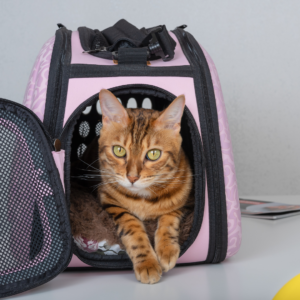
A cat in a carrier
- Bottled water – Like food, it may not be possible to get water when you need it. It’s best to be prepared with something so critical.
- Bowls – It’s tough to give food and water(!) to animals with no bowls. Either bring those they’re familiar with or check out the cool travel bowls that are available.
- Leashes and collars – These are absolutely necessary when you stop for potty breaks and when you reach your destination.
- Crate – This is highly important. It’s a great way for them to travel to be safe and confined. Also, dogs often feel secure in their crates which can be comforting. And finally, wherever you’re going will probably call for one to be available for them.
- Tag identifying information – Pets get lost on trips more often than people think so make sure your pet’s name, address, and your phone number is included on his tag.
- Vet information – Besides bringing contact information for your vet at home, do the research to get the lowdown on the closest pet emergency hospital near your destination.
- Medications – It’s easy to forget any medications your pet may need in the flurry of activity surrounding getting prepared to travel, but it’s obviously very important. Try to organize them with your own meds as soon as you think about it. But, remember to check the identifiers before you administer any to them or yourself. Human meds can be toxic to pets, plus, you probably don’t need any parasite meds.
- Vaccination information – You may need it for your dog to be admitted to certain facilities/areas. It’s also good to have just in case of an emergency.
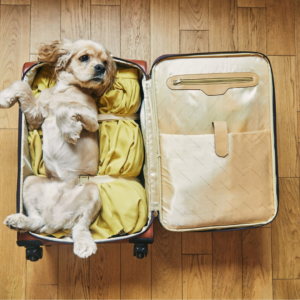
A silly dog
Extras
- Toys – Children need their iPads, pets need their chew toys or catnip. It will make everyone more comfortable.
- Blankets – Even if you’re traveling in the summer, the indoor temperature could be quite cool. They can also be relaxing to your pet. Don’t forget smaller beds for little doggies or kitty-cats. Or throw in the big one for Brutus if you have room.
- Towels – For crate accidents, to control bleeding, or for warmth, they come in handy for many situations.
- Pet shampoo – If you’ve ever had a dog who loves to play in the mud, you’ll know why this is included. They could also encounter a skunk or just be in need of a bath.
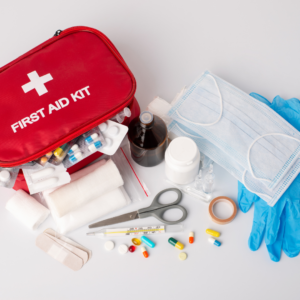
First aid kit
First-Aid Kit
Just like children, pets can get scrapes and bumps (and worse), too. Being prepared for them is as simple as bringing a kit stocked with the most simple cures. Additionally, be sure you’re familiar with attending to an injured animal. If not, you could cause harm rather than help them. Here are some basic items you should always keep in your pet first aid kit.
- GAUZE – If your pet has a wound that needs wrapping
- ADHESIVE TAPE – To secure the gauze. Do NOT use bandages for human use (Band-Aids) on an animal. Hair/fur can impede the proper hold.
- HYDROGEN PEROXIDE – 3% For cleaning small injuries
- MILK OF MAGNESIA ACTIVATED CHARCOAL – Do NOT induce vomiting before speaking with a veterinarian or poison control center representative.
- TWEEZERS – If stickers or glass have gotten into a paw or other area on your pet, these can work wonders.
- SCISSORS – To cut adhesive tape, towels, or anything else necessary
- FLASHLIGHT – It’s tough to see under hair and dirt on an animal so a flashlight should do the trick to help you see things more clearly.
- ANTIBIOTIC OINTMENT – For minor scrapes and wounds and skin irritation
- COTTON BALLS – To focus your reach on a small area like around the eyes or paws
Emergency Contacts
- ASPCA Animal Poison Control Center phone number: (888) 426-4435 (24 hours a day, 365 days a year. Charges may apply.). If you can’t reach a remote veterinary emergency hospital in the event of a possible poisoning situation, you can use this number for help.
- Pet Poison Hotline: (855) 764-7661 (24 hours a day, 365 days a year. An $85 incident fee applies)
“Always remember that any first aid administered to your pet should be followed by immediate veterinary care. First aid care is not a substitute for veterinary care, but it may save your pet’s life until it receives veterinary treatment.”
www.avma.org (American Veterinary Medical Association)
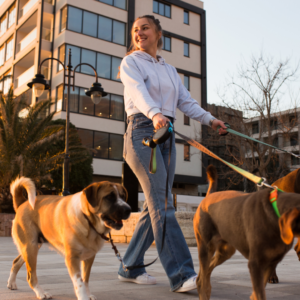
A professional dog walker
Looking For A Pet Sitter?
Pets need regular stimulation to stay happy and mentally healthy. If you don’t have the time to regularly stimulate your pets, then consider hiring a professional pet sitter! Here at Stay At Home Pet Services, we offer quality pet sitting services at competitive prices. We have over 10 years of experience, our sitters are certified in pet first aid & CPR, and we love all pets as if they were our own.
We are located in Cincinnati, OH and service the following areas of East Walnut Hills, Hyde Park, Mt Lookout, Oakley, Norwood, Kennedy Heights, Pleasant Ridge, Tusculum, East End, Mariemont, Fairfax, Madisonville, Mt Washington, Dillonvale, Deer Park, Silverton, Kenwood, Madeira, Indian Hill, and Anderson Township. Click here to become a client today or give us a call at 513-706-7702. Be sure to check us out on Facebook and Instagram too! We post everyday, so make sure you follow us so you don’t miss out on any adorable pet pictures.
References:
1. https://www.akc.org/expert-advice/health/dog-first-aid-kit-essentials/ – “Dog First-Aid Kit Essentials” – By Kaitlyn Arford – Sept 2021
2. https://www.aspcapro.org/resource/how-make-pet-first-aid-kit – “How to Make a Pet First-Aid Kit” – By Staff

